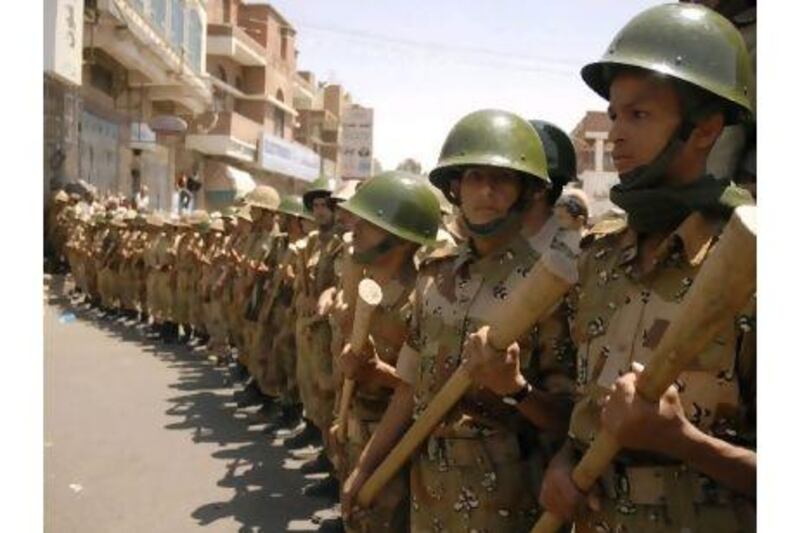SANAA // A Yemeni ruling party official denied yesterday that Ali Abdullah Saleh had tricked his Saudi hosts by returning to his country last week.
"The president's return to his country has been normal for he was in Saudi Arabia only for medical treatment," said Tarik Al Shami, the spokesman of the ruling General People's Congress.
The president appeared to have tricked his Saudi hosts when he unexpectedly returned home last week, exacerbating the stand-off between his regime and the country's pro-democracy protest movement, The Financial Times reported yesterday.
The paper quoted a senior US official saying that Mr Saleh "bolted the kingdom under the pretence of going to the airport for something else".
Neither the US nor the Saudis were aware of his planned departure, said the official, calling it a "clever, canny" trick by the president. "We are not happy at all," the unnamed Saudi official said in the article.
Mr Saleh had been in Riyadh since June, recovering from injuries and burns he received in an attack on his presidential compound in Sanaa. Yemen has been wracked by violence since February, when an uprising broke out to demand an end to his 33 years of rule.
In the Financial Times article, other western officials were quoted as reporting different versions of Mr Saleh's departure. One said Mr Saleh told the Saudis he had decided to move to Ethiopia; the other suggests he had gone to the airport on the pretence of seeing off other Yemeni officials.
Mr Al Shami dismissed the story.
"Such reports are groundless. The return of the president does not need the approval of any side to come back to his country. He does not need to inform anybody about coming back to his own country," Mr Al Shami said.
However, an official at Sanaa airport said the airport was told the plane was heading to Ethiopia but needed to land to refuel.
"We were told the plane the president was on board would land to refuel and then continue its route to Ethiopia. However, we were surprised to see the president coming out of the plane," the official told The National yesterday.
The crackdown by government on the uprising has intensified since Mr Saleh's return. More than 150 people, mainly protesters, were killed in street violence between rebel army units and government forces during the past week.
Yesterday, armed tribesmen shot down a government warplane that was bombing their positions north of Sanaa. Tribal officials said the plane was hit above Nhim region and that the pilot was captured by tribesmen in the Arhab district, 50 kilometres north of the city.
Yemen's defence ministry confirmed the incident and said the aircraft was on a routine mission over Arhab where it went down. It blamed the attack on rebel military and tribal leaders.
Tribesmen captured the pilot after he ejected when the plane crashed in the village of Beit Azar, tribal sources said.
Meanwhile, hundreds of thousands of people demonstrated near Sanaa's Change Square, the focal point of anti-regime protests.
"We shall not rest until the butcher is executed," the demonstrators chanted as they marched in a neighbourhood controlled by dissident General Ali Muhsen Al Ahmar's First Armoured Division. Security forces loyal to Mr Saleh blocked the road leading to government offices beyond the Qiyadah roundabout, forcing the protest to stay within the area controlled by the defected division. Other demonstrations were staged in the cities of Taez, Hudayda and Ibb, but all ended peacefully, witnesses said.
On Monday, tribesmen overran a military base belonging to Yemen's elite Republican Guards in the area where the aircraft had been shot down.
The capture of the base and shooting of the aircraft followed months of intermittent fighting between the tribesmen and government forces. The tribesmen refused to allow Mr Saleh's forces to move from their region to Sanaa where they could be used to move against protesters.
Mr Saleh has repeatedly refused to sign a power transfer deal brokered by the Gulf Cooperation Council (GCC) under which he would hand power to Abdrabuh Mansur Hadi, the vice president, in return for immunity from prosecution.
On Sunday, in his first public speech since his return, the president said that those who were "chasing power" should go to the polls instead of the streets. In his televised address, he said he was committed to the deal drafted by the GCC but his opponents dismissed his offer as a stalling tactic to allow him to consolidate his hold on power.
* With additional reporting from Associated Press and Agence France-Presse





